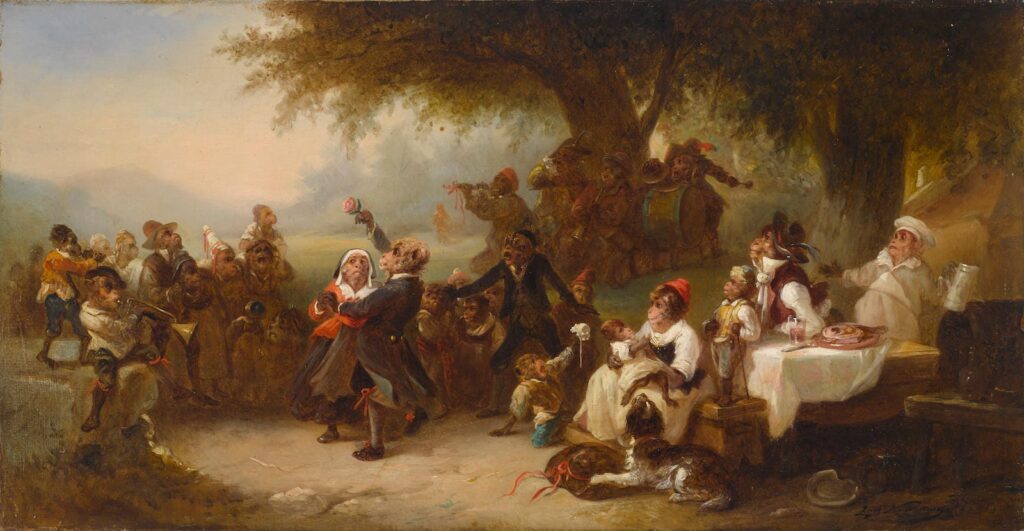
Brides and Bridegrooms
I went to a wedding this past weekend. It got me to thinking about the word bridegroom and other wedding words.
When I was little, I saw a picture of two monkeys dressed up as a bride and groom. At that point in my life, I knew more about monkeys than I knew about weddings. I’m not sure I even knew that the male lead in a wedding was called a bridegroom, but I definitely knew that monkeys groomed each other. So from that point forward, whenever I heard the word bridegroom I envisioned a monkey in a top hat and tails picking fleas off a monkey in a wedding dress—a love-monkey grooming his bride. I have since learned that this is not the origin of the word bridegroom, though the happy monkey-couple still pops into my head every now and then when people speak of brides and grooms.
As it turns out, the origin of the word bridegroom has nothing to do with grooming. The word in Old English was bryddeguma. The back half of that word, –guma, comes from a proto-Germanic word gumo, meaning “man.” Etymologically speaking, a bridegroom is just a bride’s man. But guma didn’t survive into modern English, or even Middle English. As far as I can tell, bryddeguma was the last remaining trace of guma in our language. By the sixteenth century, bryddeguma had become bridegroom (or some spelling thereof), thanks to folk etymology.
Folk etymology is the process by which a foreign or archaic word is changed and/or reinterpreted to align with more familiar words that sound similar but aren’t actually related. The word crayfish is an excellent example. In the Middle English period it came into the language as crevis, from the French crevice (it was actually a diminutive form of the word for crab). But that second syllable sounds like fish, and since we’re talking about a tasty little swimmer, crayfish makes a lot of sense, especially if you’ve never seen it written (as, indeed, most medieval Brits wouldn’t have).
In much the same way, if you’ve never heard a man called a guma, but you have always know of boys and young men who were called grooms, bridegroom seems to make as much sense as bridegume. (Grome originally meant “boy” or “youth”; it got more specific to mean “young male servant” and more specifically still to describe young male servants who take care of horses, which led to the verb forms related to brushing, combing, cultivating, etc. One could also follow words like “grooming” and “groomer” down the darker paths that they have recently traveled, but I don’t have the heart for it.)
In the near future I think I’ll devote an edition of The Habit Weekly to folk etymologies. If you have favorite folk etymologies, I’d love to hear about them; drop them in the comments below.
I’d like to backtrack to guma for just a minute. The theory is that it derives ultimately from a Proto-Indo-European word dhghem-, meaning “earth.” It’s the same word that gives rise to humus (“earth/soil”), humble (“low, close to the earth”), humility, etc. Throughout the Indo-European languages, words for “man” and/or “person” derive from this word. The Germanic languages have various forms of guma, gumo, gomi, gome, gomo, gumi, etc. The Romance languages have homo, uomo, humanus, homme, hombre, etc. The connection to dhghem-, apparently, is that we are earthlings as opposed to heavenly beings. In the Judeo-Christian tradition, these words acquire added significance from the idea that we are not only inhabitants of earth, but that we are made of earth.
Wives and Husbands
The word wife has an interesting history. In Old English and Middle English, wif meant “woman,” broadly defined. Its meaning included the current meaning of wife—that is, “married woman”— but it was not limited to that meaning. So an alewife or a fishwife may or not have been married (though she would have definitely have been a woman). Even today, there are plenty of unmarried midwives. But except for midwife, the meaning of wife has narrowed to mean specifically “married woman”
Well…there’s another huge exception, if you choose to count it. That exception is the word woman. It derives from wifman—”wife-man,” or, perhaps, “woman-man.” Really, it’s more accurate (but slightly less funny) to render it “wife-person,” or, “woman-person,” since, historically, man meant not only “male adult” but also “person” more broadly—or, you might say, “earthling.”
A husband, etymologically speaking, is a “house-dweller,” from the Old Norse hus (“house”) + bondi (dweller). Contained in that word bondi is the idea of being bound (or in bond to) a house or a piece of land. A husband not only dwells in a house, but he is also bound to it. Husbandry, then, is the management of a household; in a phrase like animal husbandry, that management extends beyond the house into the barnyard and/or pasture.
Engagement and Wedding
The words wed and wedding go back to the proto-Germanic wadja, meaning “pledge.” Words like wager and wage come from the same word. If you make a wager, you are pledging to pay up if you lose a bet. If you pay wages, you are fulfilling a pledge or agreement made between employer and employee. And if you wed another person, you are making the pledge of a lifetime.
The connection with the verb wage, as in “to wage war,” may not be self-evident, but apparently it comes down to the idea of fulfilling a promise to engage in battle. You may be familiar with the custom of, say, throwing down a gauntlet or otherwise offering a token as a pledge to engage in combat (perhaps single combat). To wage battle is to execute that pledge.
Astute readers may have noticed that I used the word engage twice in the previous paragraph. Engage, of course, is another huge star in the constellation of wedding-related words. And, like wed, it derives from the proto-Germanic wadja, by way of French. I know it’s not obvious how wed and engage might come from the same Germanic word, but stay with me. The Franks, you will remember, were Germanic. So even though French is a Romantic language, it has a good many words of Germanic origin (10%, maybe?). But the French, who have always wanted to do things their own way, had a habit of changing w’s to g’s in foreign loan words. So we say war, and they say guerre. We say William, and they say Guillaume.¹ This explains those w-g doublets in English such as ward/guard, warden/guardian, warranty/guarantee, wile/guile, and reward/regard. The w-words came straight from Old English, and the g-words, though they also of Germanic origin, took a detour through French before arriving in English after the Norman Invasion of 1066.
Wage/gage is another such doublet. The word engaged means “under a pledge,” from the French engagiere. You see the same root in mortgage, which literally means “death-pledge.” Sometimes you feel etymology all the way down in your bones. I thought long and hard about the death-pledge that time I signed a thirty-year mortgage even though I hadn’t yet lived thirty years myself.
All that to say, I find it exceedingly interesting that wedding and engagement turn out to derive from the same word, wadja.
Till Death Do Us Part
Speaking of death-pledges, I’ll end not with a question of etymology, but with a question of grammar. “Till death do us part” is truly an odd bit of syntax. In the very first Book of Common Prayer, in 1549, the marriage rite read “Till death us depart.” Depart used to mean “to separate.” When you know that, it is relatively easy to parse the grammar: death is the subject, us is the direct object. That clause, in twenty-first century English, would say “Until death separates us.”
A century later, that use of “depart” had become archaic; in the 1662 edition of the Book of Common Prayer, the wording was changed to “Till death us do part.” Read out loud, it sounds almost exactly the same. And, really, not much has changed about the grammar. Death is still the subject, us is still the object. That is to say, it is still death that separates (or parts). The helping verb do, if I understand correctly, is a subjunctive form. So probably a good rendering would be “Until death should part us.”
Now you’re more likely to hear “Till death do us part” instead of “Till death us do part” (in the US, anyway). But still, nothing has changed about the grammar. That is to say, we must resist the temptation to say “Till death do we part,” which a) makes the bride and groom the subject of the verb and b) doesn’t make sense anyway, since the point is that we are going to stay together until death, not part until death.








